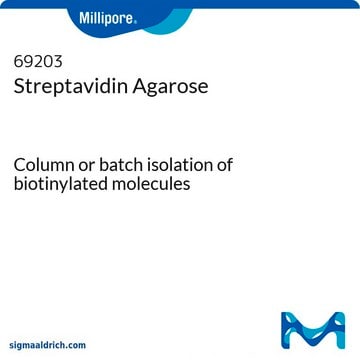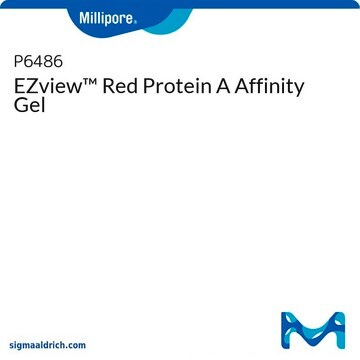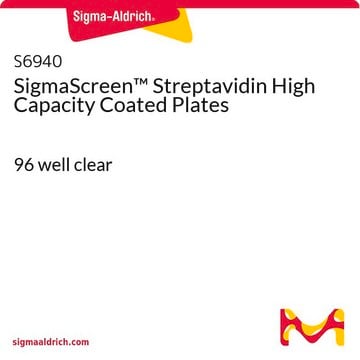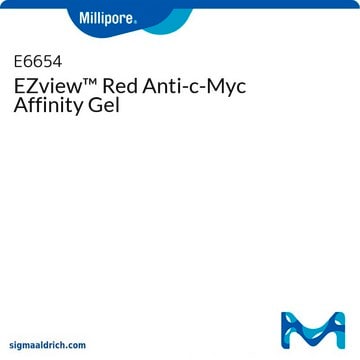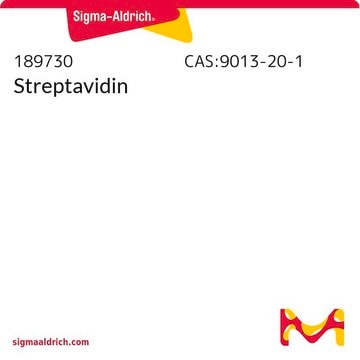Alle Fotos(1)
Wichtige Dokumente
E5529
EZview™ Red Streptavidin Affinity Gel
Anmeldenzur Ansicht organisationsspezifischer und vertraglich vereinbarter Preise
Alle Fotos(1)
About This Item
UNSPSC-Code:
41106500
NACRES:
NA.56
Empfohlene Produkte
Form
suspension
Qualitätsniveau
Haltbarkeit
1 yr
Methode(n)
western blot: suitable
Matrix
4% agarose
pH-Wert
7.2
Kapazität
~10 μg(biotin per ml of packed gel)
Versandbedingung
wet ice
Lagertemp.
2-8°C
Allgemeine Beschreibung
The EZ View Red Streptavidin Affinity gel is composed of streptavidin, covalently attached to
cyanogen bromide-activated 4% agarose beads. It is designed to capture (pull-down) the biotinylated target molecules, such as proteins, peptides, antibodies, nucleic acids, lectins, receptors and ligands.
cyanogen bromide-activated 4% agarose beads. It is designed to capture (pull-down) the biotinylated target molecules, such as proteins, peptides, antibodies, nucleic acids, lectins, receptors and ligands.
Anwendung
Sutitable for use with immunoprecipitation, western blotting,and enzyme assays.
When performing small-scale affinity capture, such as immunoprecipitation, the affinity matrix is difficult to see in the microcentrifuge tubes. Accidental aspiration of the resin leads to quantitative variability in results. The EZview™ Red Affinity Gels greatly reduce the risk of pellet loss. EZview™ resins perform as well as conventional non-colored affinity gels, but allow the user to easily differentiate pellet from supernatant. This correlates to more accurate data because less protein is lost.
Leistungsmerkmale und Vorteile
- Increased visibility - Red color reduces risk of incidental aspiration
- Improved recovery of target protein by reduced accidental loss
- Higher reproducibility - More consistent yields
Physikalische Form
1:1 (v/v) suspension in PBS containing 50% glycerol and 15 ppm Kathon
Rechtliche Hinweise
EZview is a trademark of Sigma-Aldrich Co. LLC
Lagerklassenschlüssel
10 - Combustible liquids
Flammpunkt (°F)
Not applicable
Flammpunkt (°C)
Not applicable
Analysenzertifikate (COA)
Suchen Sie nach Analysenzertifikate (COA), indem Sie die Lot-/Chargennummer des Produkts eingeben. Lot- und Chargennummern sind auf dem Produktetikett hinter den Wörtern ‘Lot’ oder ‘Batch’ (Lot oder Charge) zu finden.
Besitzen Sie dieses Produkt bereits?
In der Dokumentenbibliothek finden Sie die Dokumentation zu den Produkten, die Sie kürzlich erworben haben.
Kunden haben sich ebenfalls angesehen
Alicia M Bostwick et al.
Biochemical and biophysical research communications, 528(3), 580-585 (2020-06-09)
Mammalian cells contain genetic information in two compartments, the nucleus and the mitochondria. Mitochondrial gene expression must be coordinated with nuclear gene expression to respond to cellular energetic needs. To gain insight into the coordination between the nucleus and mitochondria
Suet Yin Sarah Fung et al.
Current biology : CB, 27(1), 78-86 (2016-12-13)
After cleavage furrow ingression during cytokinesis, nascent daughter cells remain connected by an intercellular bridge (ICB) and the midbody [1, 2]. The midbody becomes an assembly platform for ESCRT complexes that split apart the plasma membrane (PM) anchored to the
Katarzyna M Zientara-Rytter et al.
Cells, 11(1) (2022-01-12)
Pex11, an abundant peroxisomal membrane protein (PMP), is required for division of peroxisomes and is robustly imported to peroxisomal membranes. We present a comprehensive analysis of how the Pichia pastoris Pex11 is recognized and chaperoned by Pex19, targeted to peroxisome
Ting-Yu Chang et al.
Biomedicine & pharmacotherapy = Biomedecine & pharmacotherapie, 138, 111485-111485 (2021-03-20)
Aberrant alteration of epigenetic information disturbs chromatin structure and gene function, thereby facilitating cancer development. Several drugs targeting histone deacetylases (HDACs), a group of epigenetic enzymes, have been approved for treating hematologic malignancies in the clinic. However, patients who suffer
Iram Khan Iqbal et al.
Autophagy, 17(11), 3511-3529 (2021-01-19)
The deacetylase SIRT1 (sirtuin 1) has emerged as a major regulator of nucleocytoplasmic distribution of macroautophagy/autophagy marker MAP1LC3/LC3 (microtubule-associated protein 1 light chain 3). Activation of SIRT1 leads to the deacetylation of LC3 and its translocation from the nucleus into
Unser Team von Wissenschaftlern verfügt über Erfahrung in allen Forschungsbereichen einschließlich Life Science, Materialwissenschaften, chemischer Synthese, Chromatographie, Analytik und vielen mehr..
Setzen Sie sich mit dem technischen Dienst in Verbindung.
